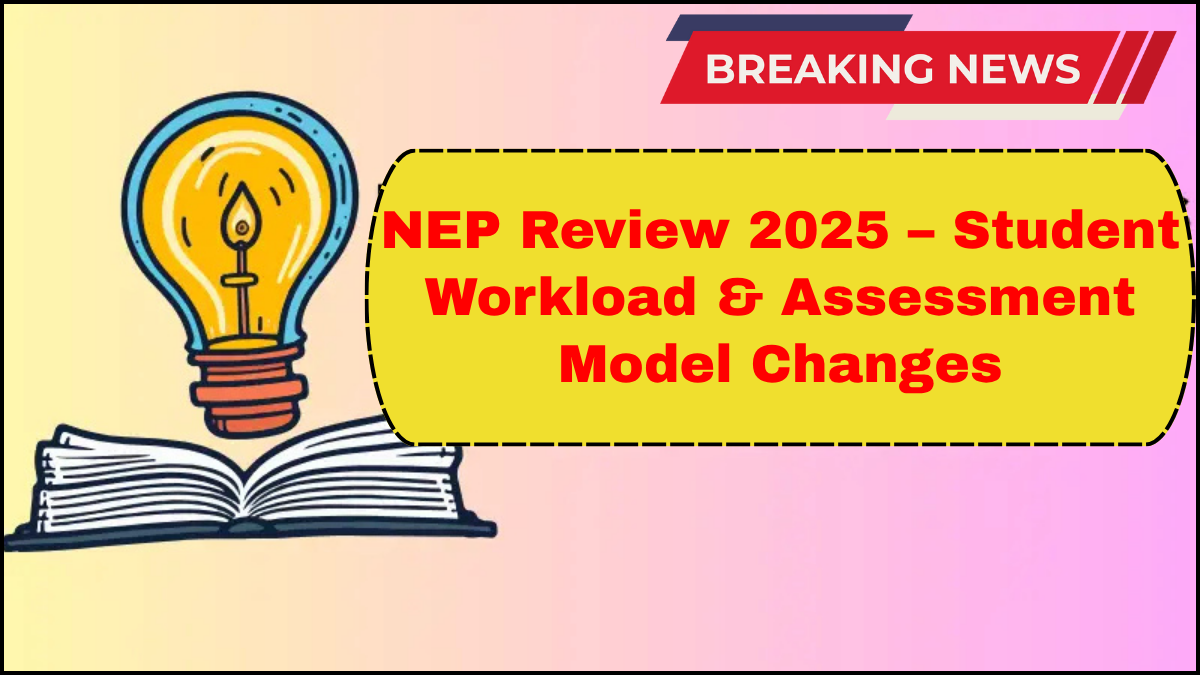The National Education Policy Review 2025 brings a decisive shift in how students across India experience education. With mounting concerns about excessive pressure on students and outdated evaluation methods, the new updates target two key pain points: student workload and the assessment model. This latest iteration reflects a more balanced, inclusive, and skills-driven approach to learning.

Below is a detailed look at what’s changing, why it matters, and how these reforms could redefine education standards across the country.
Redefining Student Workload: Quality Over Quantity
One of the most prominent features of the NEP Review 2025 is its sharp focus on restructuring the student workload. For years, students, parents, and educators have raised concerns about overloaded timetables, rote learning, and unrealistic homework expectations.
Key Workload Changes:
-
Reduced Rote Learning: The curriculum is being revised to remove redundant topics and emphasize core concepts, critical thinking, and problem-solving.
-
Interdisciplinary Approach: Students will be encouraged to explore subjects beyond their streams—science students can take music, humanities students can study data literacy, and so on.
-
Homework Redesign: Instead of repetitive tasks, homework will now focus on creativity, exploration, and application of classroom concepts.
-
Flexible Timetables: The policy promotes flexible learning hours, especially for senior students, allowing them to manage stress and balance extracurriculars with academics.
These changes aim to ensure that student workload is aligned with developmental stages, interests, and real-world application. More importantly, it shifts the focus from memorization to understanding.
Overhauling the Assessment Model
Another significant area under the National Education Policy Review 2025 is the overhaul of the traditional exams and evaluation system. For decades, high-stakes board exams and a one-size-fits-all approach have defined Indian education. This review introduces a more dynamic and student-centric assessment framework.
Key Reforms in Assessment:
-
Multi-modal Assessments: Students will be assessed through a combination of written tests, project-based work, oral presentations, and group activities. This helps in gauging diverse skill sets beyond academic knowledge.
-
Competency-Based Evaluations: The focus is shifting from “what you remember” to “what you can do with what you know.” Competency-based testing ensures students are not just test-savvy but also conceptually strong.
-
Year-Round Evaluations: Instead of placing undue pressure on year-end exams, continuous formative assessments will be introduced throughout the year.
-
Board Exam Revamp: Board exams will become modular and can be taken multiple times—students can improve scores without the fear of losing an entire year.
-
Holistic Progress Cards: These will replace traditional report cards and will reflect academic progress, cognitive skills, values, and life skills.
This modernized assessment model emphasizes learning outcomes over marks, supporting the holistic development of students while reducing exam-related anxiety.
Bridging the Urban-Rural Divide
The NEP Review 2025 also ensures that these changes are not limited to elite schools. Infrastructure grants, teacher training modules, and access to digital learning tools are being rolled out to government schools across India. This ensures that students from rural or under-resourced backgrounds benefit equally from the reduced student workload and modernized exams.
Integration of Technology
Digital tools will play a major role in both workload management and assessments. AI-based learning platforms will offer personalized feedback, adaptive learning paths, and instant performance tracking. This tech integration not only modernizes the learning environment but also helps teachers pinpoint learning gaps more accurately.
Teacher Empowerment and Training
To make these reforms successful, teachers are being trained to:
-
Shift from lecture-based delivery to experiential learning.
-
Design flexible lesson plans aligned with the new curriculum structure.
-
Implement competency-based assessments effectively.
Educators will now serve more as facilitators of learning than content deliverers.
Long-Term Impact of NEP 2025 Reforms
The National Education Policy Review 2025 is not just a set of rule changes—it’s a cultural shift. With a focus on reduced pressure, deeper understanding, and skill-based assessments, the reforms prepare students not just for exams, but for life. If implemented with integrity and accountability, these changes could significantly enhance India’s educational landscape in the coming decade.
FAQs
Q1. How does the NEP Review 2025 help reduce student workload?
The policy trims unnecessary content, emphasizes quality learning, and redesigns homework and timetables to reduce pressure while improving comprehension.
Q2. What is the biggest change in the new assessment model?
The move toward multi-modal, competency-based, and continuous assessments marks a major departure from the traditional one-time exam system.
Q3. Will board exams still exist under NEP 2025?
Yes, but they’ll be modular, flexible, and held multiple times a year, reducing the stress associated with a single, high-stakes test.
Q4. How are rural schools included in these reforms?
Special infrastructure support, teacher training, and digital access initiatives ensure that students in rural areas benefit equally from NEP 2025 reforms.
Q5. Is teacher training a part of the policy update?
Absolutely. Teachers are being trained extensively to adapt to new pedagogical techniques and assessment methods aligned with NEP 2025.
click here to learn more